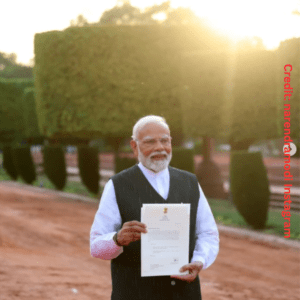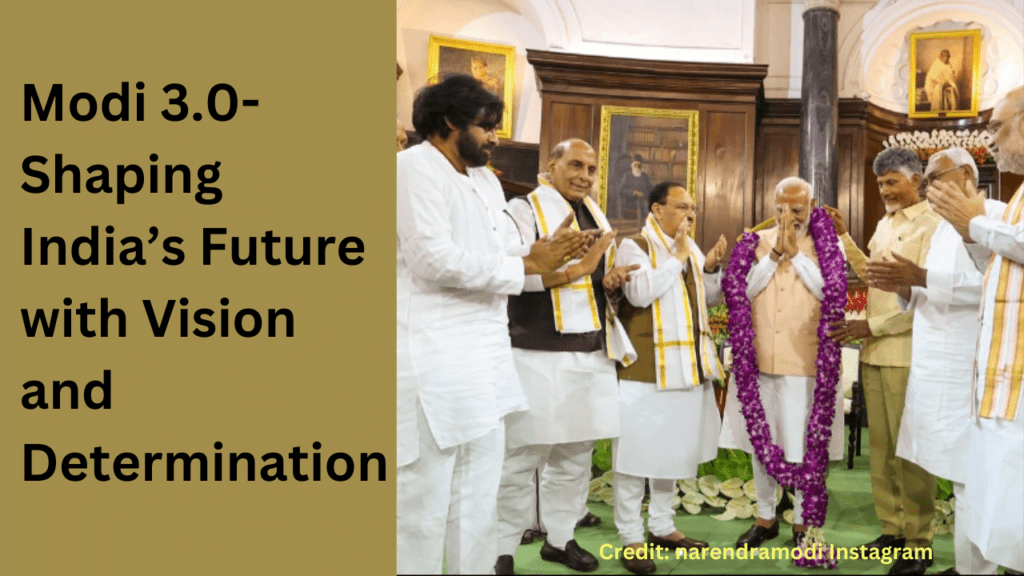Modi 3.0:

India stands at a moment of profound transformation as Narendra Modi takes office for the third time as Prime Minister. Modi 3.0 onwards is a radical departure from his previous terms, aimed at propelling India into a new era of development, technological revolution and global dominance. The present term aims to build on past successes even as it comes up with innovative solutions to fresh challenges.
Table of Contents
A Legacy of Transformation:
The first two terms of office for Narendra Modi were characterized by major economic reforms policies and programs to drive growth, social development and global positioning. His administration initiated bold initiatives like Goods and Services Tax (GST) system that simplified the country’s complex tax regime and Digital India program which sought to improve digital infrastructure and connectivity throughout the country.
Socially, schemes such as Swachh Bharat Abhiyan or ‘Clean India Mission’ and Pradhan Mantri Awas Yojana or ‘Housing for All’ have been instrumental in various ways. Swachh Bharat Abhiyan enhanced hygiene practices and public health while Pradhan Mantri Awas Yojana sought to make housing affordable for urban and rural poor.
At the international level, PM Modi’s foreign policies have strengthened India’s relationship with key global powers while expanding its presence in global forums. Modi’s “Act East” policy sought to engage more meaningfully with Southeast Asian nations while “Neighbourhood First” policy was about deepening ties with neighbouring countries.

Economic Resilience and Growth:
The next phase will likely see a stronger emphasis on artificial intelligence (AI), blockchain, and the Internet of Things (IoT). Investments in these technologies will not only drive economic growth but also enhance governance mechanisms and service delivery systems within India. For instance, AI can make agriculture more productive, efficient, and transparent; blockchain can do the same for public sector operations and transactions.
Moreover, the rollout of 5G technology will definitely change many things including faster internet speeds thus enabling new possibilities such as healthcare services or education systems which people have never seen before. This also supports the emergence of smart cities throughout the country aimed at improving life quality in urban areas.
Social Development and Inclusivity:
Besides focusing on social development and inclusivity, Modi is also known for his other key roles in leadership. It is expected that his legacy will continue with various new endeavours that uplift marginalized sections of society in Modi 3.0. For instance, Jan Dhan Yojana has brought millions of unbanked individuals into the financial mainstream because of government’s commitment to financial inclusion.
The other major areas of concern would be education and healthcare. We look forward to a holistic education system that is flexible enough to accommodate the needs of the 21st century as stated by New Education Policy (NEP) 2020.This has been done in order make students think critically so that they can be able to solve problems creatively in their lives across borders that are disappearing due globalization.
In health care sector, Ayushman Bharat Scheme ,which provides health insurance to over 500 million people in India could also see further improvement. The pandemic showed us how important it is to have strong health systems and therefore, in Modi 3.0 there would be an increase of medical professionals number, development of healthcare infrastructure ,as well as provision of affordable medical services to each citizen.
Environmental Sustainability and Climate Action:
Environmental sustainability is expected to be central to the goals of Modi 3.0. This is because the government created several measures that include a commitment to the Paris Agreement made by India combined with renewable energy targets which show a resolute action against climate change. The country has also taken steps towards this direction through initiatives like International Solar Alliance and switch to electric vehicles (EVs).
Moreover, the share of renewables in the energy mix should be increased due to the promotion of renewable energy projects by Modi’s government– thus addressing not only environmental issues but also reducing reliance upon fossil fuels thereby ensuring energy security.
Additional efforts that will be made include combating air and water pollution, biodiversity conservation and sustainable agriculture for example. The Jal Jeevan Mission is aimed at providing safe drinking water in rural areas while maintaining it’s enough amounts for other uses; indeed it defines Indian commitment to both health and sustainable development.
Strengthening Democracy and Governance:
Moreover, the governance approach used by this administration will emphasize on strength.


11 thoughts on “Modi 3.0 – Shaping India’s Future with Vision and Determination”